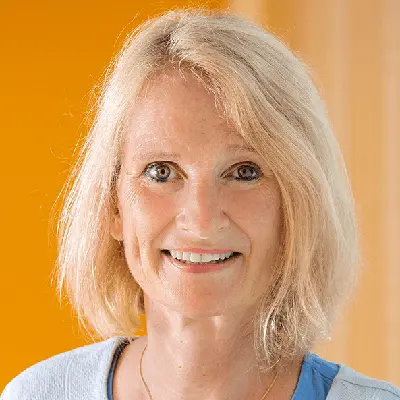Prof. Dr. Ursula Klingmüller

Head of Division – Systems Biology of Signal Transduction – German Cancer Research Center (DKFZ) Heidelberg
smart-nafld Coordinator
Role in LiSyM-Cancer
- Coordinator and project leader in SMART-NAFLD
- Examining signal transduction and metabolism crosstalk and its relation to plasma markers for liver cancer progression
- Project leader in C-TIP-HCC
- Emphasizing dynamic pathway modeling of TGFb signal transduction and ECM remodeling in cirrhosis context
Expertise
- Combines quantitative analysis with mathematical modeling to understand key regulatory mechanisms in information processing and cell fate decisions.
- Focuses on signaling pathways in liver regeneration and liver cancer.
- Advances mass spectrometry-based proteomics for systems medicine, emphasizing absolute quantification of signal transduction proteins and plasma proteins quantification.
Degrees
- 2004, Venia Legendi in Cell Biology, Heidelberg University
- 2000, Habilitation and Venia Legendi in Molecular Biology and Genetics, University of Freiburg
- 1992, Graduate Studies at Heidelberg University, Doctoral Thesis in Molecular Virology
- 1988, Diploma in Molecular Biology, Cell Biology and Virology, Heidelberg University
- 1985, Bachelor of Science, University of Bayreuth
Professional Experience
- Since 2011, W3 Professor, Heidelberg University, Germany
- 2003 – 2007, Group Leader of the Theodor-Boveri-Group "Systems Biology and Signal Transduction", DKFZ, Heidelberg
- 1996 – 2003, Group Leader of an Independent Junior Group (Hans-Spemann-Laboratories), Max-Planck-Institute of Immunobiology, Freiburg, Germany
- 1993 – 1996, Postdoctoral fellow, Whitehead Institute for Biomedical Research, Cambridge, USA
- 1992 – 1993, Postdoctoral fellow, Harvard Medical School, Boston, USA
Honors and Awards (selection)
- Since 2020, Elected EMBO Member
- 2020 – 2024, Re-election as Member of the German Ethics Council
- 2016 – 2020, Election as Member of the German Ethics Council
- 2012 – 2017, Election as Member of the DFG "Hinterzartener Kreis of Cancer Research"
